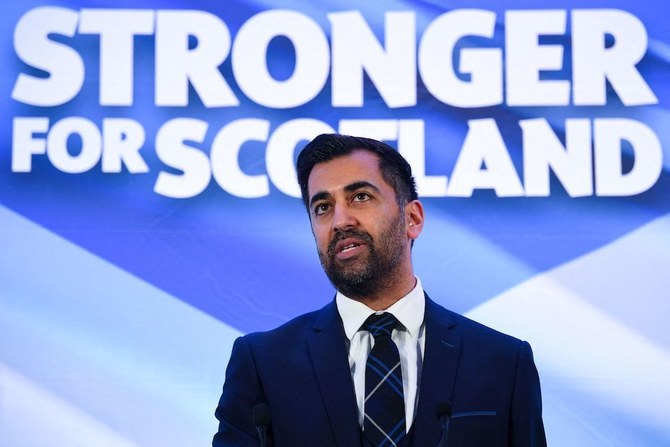LONDON: Half of Scottish people quizzed in a new poll believed First Minister Humza Yousaf had done a bad job in his first 100 days in the position.
Glasgow-born Yousaf, who took his oath in English and Urdu when he was first elected to the Scottish Parliament in 2011, is the youngest Scottish National Party leader at 37 and the first Muslim leader of a major UK political party.
In a YouGov survey of 1,100 Scots, conducted between June 26 and 29, 50 percent said he had done a bad job while only 23 percent backed his record since becoming first minister in March.
That compared to less than 20 percent who felt he was doing a good job and 44 percent who thought he was not in an April poll when Yousaf had only been in the job a matter of weeks.
Yousaf has had to contend with an ongoing investigation into alleged financial misconduct within the SNP, which saw his predecessor Nicola Sturgeon and her husband questioned by police. He has also faced criticism over policy U-turns on the controversial deposit return recycling scheme and highly protected marine areas.
Just over a quarter (28 percent) had a favorable view of Yousaf, while 51 percent had an unfavourable view of the first minister.
Those polled were given six topics and asked to evaluate Yousaf’s performance, which included the cost-of-living crisis, the wider economy, the investigation into the SNP’s finances, healthcare in Scotland, climate change, and Scottish independence.
Scots rated him lowest on the cost-of-living crisis, with only 15 percent thinking he had done well as opposed to 60 percent who believed the opposite. He was best rated (22 percent in favor) over his handling of the party finances issue, with just under half (48 percent) stating the opposite opinion.
Alongside his rating for handling of the cost-of-living issue, Yousaf was worst rated on his healthcare policies (56 percent unfavorable) and over his stewardship of the Scottish economy where 55 percent of those questioned reckoned he was doing a bad job.
The poll also found backing for Scottish independence had fallen by 2 percent since the April polling, from 39 percent down to 37 percent, with 18 percent of those polled stating they thought Yousaf had handled the subject well, and 50 percent saying he had not.
Yousaf’s job rating compared better to British Prime Minister Rishi Sunak, who only one in five (22 percent) Scots rated as doing a good job leading the UK, with 59 percent saying the Conservative leader was doing a bad job.
With a general election likely in the UK next year, polling data currently shows the SNP to be the most popular party in Scotland, but figures also revealed the gap had narrowed to other parties in recent months.
“In his first 100 days, Humza Yousaf defined the core missions of his administration – equality, opportunity, community – and introduced substantial measures to help achieve these aims,” a statement from Yousaf’s office said while outlining policies which proved his “record of delivery.”
The statement added: “Putting the needs of people is at the heart of everything we do as a government.”
However, opposition figures from both the Scottish Labour Party and Scottish Conservatives disagreed.
Labour deputy leader, Jackie Baillie, said: “(He has) somehow managed to fall short of the low expectations we had of him.
“He has been missing in action while Scots struggled with the worst cost of living crisis in decades and the NHS crisis he let spiral as health secretary, he failed as transport minister, justice secretary, health secretary – and now he is failing as first minister too, leaving his party and our country in chaos,” she added.
Craig Hoy of the Conservatives said the “only surprise” from the YouGov poll was that it was just 50 percent of Scots who thought Yousaf was doing a “terrible job,” criticizing the first minister of focusing too much on independence.
“The first minister has watched several of his flagship policies fall to pieces and his party descend into open warfare, and there’s still a huge shadow over their conduct and murky finances.
“Meanwhile, while Humza pushes his independence obsession, the health service is at breaking point, the ferries fiasco continues, public services have been slashed, and a further £1 billion black hole in the budget has been announced.
“Anyone who doesn’t find that disastrous must have been on the Moon for the past 100 days.”


























